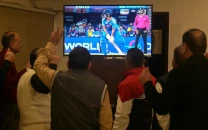PTI to knock at SC’s doors for resignations
Party to move petition next week seeking top court's intervention in the lingering matter

As the issue of the resignations of PTI leaders from the National Assembly remains unsettled despite repeated attempts to seek final approval from the speaker, the party has decided to take the unresolved matter to the Supreme Court where an application for the same will be moved next week.
Chaudhry Faisal Hussain, advocate representing the PTI General Secretary Asad Umar, has already filed a petition in the apex court against the IHC decision for not giving a declaration that the acceptance of resignations of 123 lawmakers by the then deputy speaker had taken effect and that the speaker has no power or jurisdiction regarding verification thereof.
Moreover, the PTI had requested the IHC to give another declaration that the speaker is bound to forward the 123 accepted resignations of PTI MNAs en bloc to the Election Commission of Pakistan to enable it to de-notify all the 123 members and issue a schedule for the by-election.
However, the then IHC Chief Justice Athar Minallah had rejected the petition.
The IHC CJ referred to a 2015 judgment wherein it was held that for a resignation to take effect under Article 64 of the Constitution, it was not enough that the member has written it under his or her name addressed to the speaker.
“The crucial test, or mandatory prerequisite for the seat to become vacant on resignation, is the fulfilment of the constitutional duty of the speaker to be satisfied that three factors are established; firstly, that it is tendered voluntarily, secondly, it is genuine and lastly, that the member actually intended to relinquish, relieve or quit the post, position or seat and thereby vacate the seat. It is also not enough that the member who has tendered the resignation makes public announcements in this regard, or presents him or herself in mass before the speaker,” the said ruling stated.
It said that the speaker was under a constitutional duty to undertake an inquiry personally to satisfy himself regarding the three factors or requirements in each case independently.
“The aforementioned three requirements are to be "proved positively" to the satisfaction of the speaker. Furthermore, if before the inquiry is concluded, or/and the Speaker has not passed any order, nor achieved the level of satisfaction so required for giving effect to the resignation, the member retracts by communicating in any manner, whether in writing or through conduct, such as by making a public announcement or attending the sittings of the National Assembly, then the resignation written and addressed to the speaker becomes ineffective as it is no more valid and no further order or action would be required", the order said.
Doubts
The court also said that the nature of the political arena was such that while the member may have individually written his resignation addressed to the speaker, coupled with announcing it publically, yet may not have intended to actually relinquish or quit the seat. Such reasons may be countless and unfathomable.
It cited the political history of the country which, it recalled, was replete with such instances as affirmed and reflected in the cases referred to above. “Mass resignations have been handed over to please the leader of a political party, or it may also have been tendered as an expression of protest without actually intending to completely relinquish ties with the seat against which the people had elected the member.”
It is settled law that the constitution has, therefore, clearly vested these powers in the speaker, and to his or her satisfaction pursuant to undertaking an inquiry. If the speaker has not attained the level of satisfaction required, the resignations will remain ineffective.
Even if the speaker has expressed his satisfaction that the resignations were not intended to be voluntary or genuine, or that the member had not intended to relinquish his or her seat, “the judicial review of such opinion formed by the speaker and his satisfaction will remain beyond the pale of the jurisdiction of this court under Article 199 of the Constitution”.
Similarly, it continued, if the member retracts during the inquiry undertaken by the Speaker and before the latter gives effect thereto, the resignation becomes automatically ineffective
In such an eventuality, no direction by way of issuing a writ of mandamus can be issued in exercise of powers vested by this court under Article 199 of the Constitution, as there is no law which requires the Speaker to give effect to an instrument which has become ineffective, it added.
The order said that the onerous duty imposed on the speaker under Article 64 of the Constitution, to exercise extreme care and caution before giving effect to resignation, it would be relevant to examine the scheme of the constitution and the law relating to filling a seat of the National Assembly and the vacation thereof.
"Article 50 of the Constitution provides that the Majlis-e-Shoora (hereinafter referred to as the 'Parliament) shall consist of the President and two Houses, respectively known as the National Assembly and the Senate. Article 51 provides for the composition of the National Assembly and the manner in which its 342 seats are to be filled,” it added.
“272 seats, divided amongst provinces and other specified areas, fall under the category known as general seats. The general seats are filled by members from each constituency through election by a direct and free vote in accordance with law, while the sixty seats reserved for women or minorities are filled in the manner as provided under Article 51(6) of the Constitution.”
It noted that qualifications and disqualifications for membership of the parliament were provided in Articles 62 and 63 of the Constitution, adding that the vacation of a seat is to take effect under Article 64.
Likewise, Chapter 2 of Part IV of the Constitution provides for the elections for filling the seats in the respective provincial assemblies. Part VIII of the Constitution i.e. Articles 213 to 226, specifically relate to elections.
It is pertinent to note that during the hearing of the NAB law amendments case on December 14, SC Judge Justice Syed Mansoor Ali Shah had said the apex court could intervene to get the resignations of PTI members from the National Assembly accepted within a few days.
Justice Shah said that lawmakers' constituencies could not be kept hanging for so long, as it is against the concept of parliamentary democracy.
Later, PTI MNAs met with Speaker National Assembly Raja Pervez Ashraf for the acceptance of their resignation collectively. However, he insisted on individual meetings.
Following the meeting, the PTI senior leader announced to approach the Supreme Court for the acceptance of MNAs resignation.
PTI lawyer Chaudhry Faisal Hussain has also confirmed to The Express Tribune that an application would be moved in an earlier pending case regarding the acceptance of MNAs resignation.
The lawyer pinned hopes on the remarks of one of the SC judges who had already offered the apex court’s intervention regarding the acceptance of resignations.
Meanwhile, a senior government functionary believed that mass resignation should be accepted and ruling political parties should not contest by-elections. He said that if the PTI lawmakers resign then the government may appoint a caretaker prime minister easily.


















COMMENTS
Comments are moderated and generally will be posted if they are on-topic and not abusive.
For more information, please see our Comments FAQ